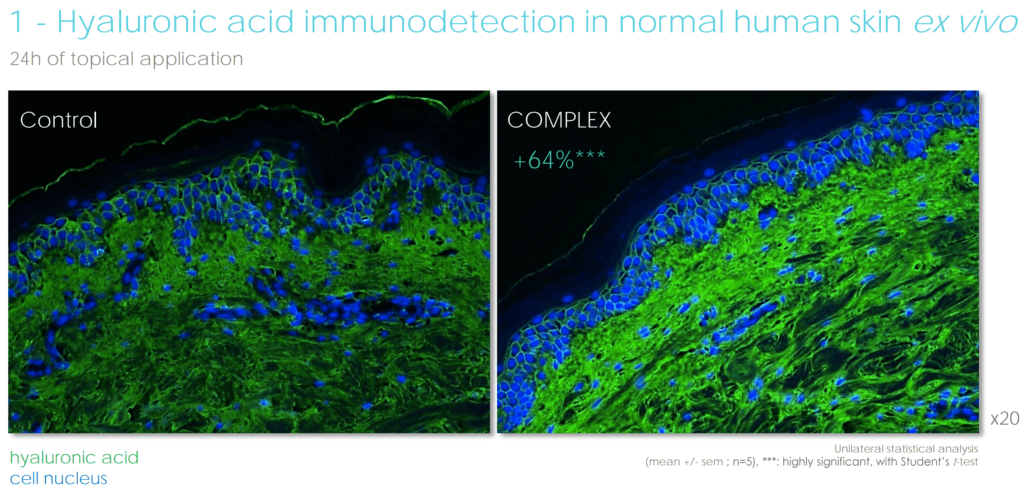Table of contents
What is hyaluronic acid?
Hyaluronic acid is one of the most popular and common ingredients in skin care cosmetic products.
Because it has the word "acid" in its name, many people are confused to think that like salicylic or glycolic acid, hyaluronic acid has a peeling (or exfoliating) effect. In practice, hyaluronic acid has very little in common with alpha hydroxy acids (such as glycolic acid) or beta hydroxy acids (such as salicylic acid).
Hyaluronic acid is found naturally in the skin, connective tissues, eyes and joints. It helps determine skin texture, repair damaged tissue, and lubricate joints. The highest amount of hyaluronic acid in the body is found in the skin, mostly within the dermis layer and a small part in the epidermal layer.
Hyaluronic acid is a very significant component in the extracellular matrix, which is a gel-like substance that surrounds the skin cells, of which collagen and elastin are also a part. Hyaluronic acid is a glycosaminoglycan (polysaccharide made up of a disaccharide unit that repeats itself multiple times) and as such it absorbs water and thus helps in skin moisturizing. It attracts water from the dermis and moves it to the epidermal layer. It also has therapeutic and anti-inflammatory properties that have been proven in clinical trials.
With age, and especially with exposure to sunlight, smoke and free radicals, the amount of hyaluronic acid in the skin decreases. The skin no longer produces hyaluronic acid as efficiently as it used to, which is part of the reason why the skin becomes thinner and drier with age.
After the age of 40, the levels of hyaluronic acid in the skin drop sharply.
The benefits of hyaluronic acid
Hyaluronic acid – the ultimate moisturizer
The fame of hyaluronic acid is mainly due to its ability to improve the moisture levels in the skin. It attracts water to it and helps the skin regain moisture.
Used in cosmetic products containing hyaluronic acid, it helps in the transfer of moisture from the deeper layers of the skin to its outer layers. In places with humid climates, it can also "capture" water from the air into the skin.
Cosmetic products with hyaluronic acid help retain moisture in the skin and prevent it from evaporating into the open air. Hyaluronic acid can hold an incredible amount of water up to 1,000 times its own weight.
Hyaluronic acid for all skin types
Hyaluronic acid increases the moisture levels in the skin without adding fat. It is an ingredient that feels "light" on the skin and can also be incorporated into non-oily products. Hence is also suitable for those with oily skin or those with a tendency to acne.
Hyaluronic acid – has therapeutic properties
לחומצה היאלרונית תפקיד מפתח בריפוי פצעים. למרות שחוצמה היאלרונית נוכחת באופן טבעי בעור, הריכוזים שלה עולים כאשר מזוהה נזק הזקוק לתיקון. חומצה היאלרונית מסייעת לפצעים להחלים מהר יותר על ידי ויסות רמות הדלקתיות, וסימון לגוף לבנות יותר כלי דם באיזור הניזוק.
לחומצה היאלרונית יש גם תכונות אנטי-בקטריאליות, ולכן היא יכולה לסייע בהפחתת הסיכון לזיהום, כאשר היא נמרחת ישירות על פצעים פתוחים. יתרה מזאת, היא גם הוכחה קלינית כיעילה נגד מחלות חניכיים, בריפוי לאחר ניתוחי שיניים ובריפוי אפטות ופצעי עור אחרים בחלל הפה, כמו גם בהקלה על אדמויות בעור ודרמטיטיס.
בשל תכונותיה אלה, פעמים רבות – בהחלמה לאחר פילינג כימי או טיפולי לייזר, ימליצו על השימוש בקרמים המכילים חומצה היאלרונית.
Hyaluronic acid – filler
Although topical hyaluronic acid can not correct the signs of artificial aging, its injection into the skin certainly can. Hyaluronic acid can be injected directly into the skin to fill in deep wrinkles and creases. It is also used in face sculpting, injections for cheeks or lips.
Hyaluronic acid injections stimulate the skin to produce more collagen on its own, thus having longer-lasting anti-aging consequences.
Sodium Hyaluronate
Sodium salt of hyaluronic acid. The main difference between the two is that sodium hyaluronic acid is absorbed into the skin much more easily than its bigger sister, hyaluronic acid.
A word from the doctor – is hyaluronic acid an "anti-aging" substance – reduces wrinkles and increases skin elasticity?
Many times credit is given, unjustifiably, to hyaluronic acid as one that knows how to "rejuvenate the skin", while in face hyaluronic acid is more of a super-moisturizer.
Hyaluronic acid is a macromolecule, meaning its molecules are large – too large to be efficiently absorbed into the skin. Therefore, applying hyaluronic acid topically (applying to the skin) will not increase the natural accumulations of hyaluronic acid in the skin and therefore will have only a minimal effect on skin aging. At the same time, its effect on skin hydration levels is far more significant.
Since the size of the hyaluronic acid molecule prevents the ability to replenish the natural hyaluronic acid deposits in the skin through its external consumption, the correct way to replenish these accumulations is by consuming other active ingredients that stimulate the production of hyaluronic acid independently by the skin cells themselves.
This is exactly what the SUPCERAT™, a unique complex that I developed in the prestigious ASHLAND laboratories, in France, does. The SUPCERAT™ has been clinically proven to increase the amount of self-production of hyaluronic acid in the skin by 64%, in just 24 hours of topical application.


